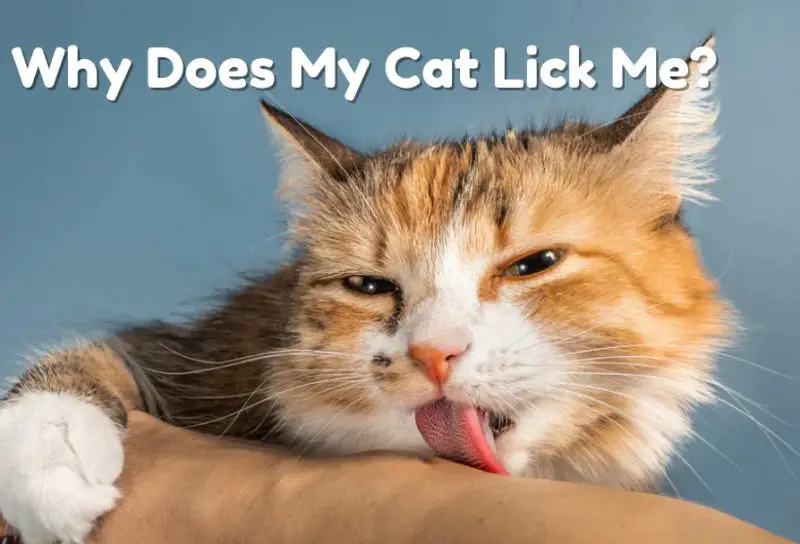Cats are fascinating and mysterious creatures, and their behaviors often leave pet owners curious. One common behavior that cat owners frequently observe is their cat licking them. While this may seem endearing or puzzling, there are several reasons behind this action.
In this article, we will explore the top reasons why your cat licks you, what it means, and how to respond to this behavior.
1. Showing Affection and Bonding

Cats are known for forming strong bonds with their owners, and licking is one way they express their affection. This behavior often stems from kittenhood when their mothers groomed them to show care and protection. By licking you, your cat may be replicating this nurturing behavior, indicating trust and a sense of safety.
Signs of Affection
- Purring while licking
- Kneading with their paws
- Rubbing their head against you after licking
How to Respond
If your cat licks you to show affection, you can respond by petting them or speaking to them in a calm, soothing tone. This positive reinforcement strengthens your bond.
2. Marking Territory
Cats are territorial animals, and licking can serve as a method of marking their territory. Cats have scent glands in their tongues, and by licking you, they transfer their scent, claiming you as part of their territory.
Why Cats Mark Territory
- Establishing ownership
- Creating familiarity and comfort
- Reducing stress through scent-marking
How to Respond
If your cat is marking you, it’s a sign that they feel secure around you. Acknowledge their behavior with gentle strokes, but ensure this doesn’t lead to excessive territorial actions like aggression.
3. Grooming Behavior
Cats are meticulous groomers, and their licking behavior may extend to their owners as a way of including you in their grooming routine. This is often seen as a sign of social bonding, similar to how cats groom each other in the wild.
Is Grooming a Problem?
While occasional licking is normal, excessive grooming might indicate anxiety or stress in your cat. Pay attention to their behavior to ensure they are not over-grooming themselves or others.
How to Respond
If the grooming behavior is occasional, appreciate it as a sign of trust. If it becomes excessive, consult a veterinarian to rule out stress or underlying health issues.
4. Seeking Attention
Sometimes, your cat may lick you simply to get your attention. Cats are intelligent animals and quickly learn that licking can be an effective way to make you focus on them.
Signs Your Cat Wants Attention
- Licking followed by meowing
- Pawing or nudging
- Sitting on your lap or keyboard
How to Respond
Provide your cat with attention by playing with them, petting them, or offering treats. Make sure they have plenty of toys and activities to stay occupied.
5. Tasting Something Interesting
Cats have an excellent sense of smell, and they may lick you because they are curious about a scent or residue on your skin. Lotions, perfumes, or even the saltiness of sweat can attract their attention.
Is This Behavior Safe?
In most cases, this behavior is harmless. However, some lotions or skincare products might contain chemicals that are unsafe for cats. Always check labels and avoid products with harmful ingredients.
How to Respond
If your cat licks you due to a scent, wash your skin to remove any residue. Redirect their attention with toys or treats.
6. Stress or Anxiety Relief
Licking can also be a self-soothing behavior for cats dealing with stress or anxiety. Cats often lick themselves to calm down, and this behavior can extend to licking their owners.
Signs of Stress in Cats
- Excessive grooming or licking
- Hiding or avoiding interaction
- Changes in appetite or litter box habits
How to Respond
Identify potential stressors in your cat’s environment, such as loud noises, changes in routine, or the introduction of new pets. Provide a quiet, comfortable space and consider using calming products like pheromone diffusers.
7. Showing Trust and Respect
In cat social structures, grooming is often a sign of respect and trust. If your cat licks you, it may be demonstrating that it views you as part of its family or social group.
How to Respond
Appreciate the behavior as a positive sign of bonding. Continue to build trust through regular interaction and positive reinforcement.
8. Exploring Textures and Tastes
Cats are naturally curious creatures, and licking allows them to explore different textures and tastes. Your skin might have an interesting texture, or they might be intrigued by the taste of salt from sweat.
How to Respond
Redirect their behavior with interactive toys or cat-friendly treats if you prefer to limit licking.
9. Mimicking Kitten Behavior
Kittens lick their mothers as a sign of dependence and affection. Adult cats may retain this behavior and direct it toward their owners, especially if they were separated from their mothers at an early age.
How to Respond
Provide comfort and reassurance if your cat displays this behavior. Avoid discouraging it unless it becomes excessive.
10. Health Concerns
In some cases, excessive licking can be a sign of underlying health issues, such as allergies, infections, or pain. Cats may lick their owners as a way to cope with discomfort.
When to Be Concerned
- Persistent or aggressive licking
- Signs of skin irritation or hair loss
- Behavioral changes
How to Respond
Consult your veterinarian if you notice any unusual licking patterns, especially if they are accompanied by other symptoms.
Should You Stop Your Cat from Licking You?
While licking is generally harmless, it’s important to consider your comfort and your cat’s well-being. If you find the licking unpleasant, gently redirect their behavior without punishing them.
Tips to Manage Licking
- Offer distractions, like toys or treats.
- Use positive reinforcement for alternative behaviors.
- Ensure your cat has a stress-free environment.
Conclusion
Cats lick their owners for various reasons, ranging from affection and bonding to marking territory and relieving stress. Understanding the reasons behind this behavior can help strengthen your relationship with your feline companion. While occasional licking is usually harmless, always pay attention to changes in behavior and consult a veterinarian if needed.
By appreciating and responding appropriately to your cat’s licking, you can ensure a happy and healthy bond with your furry friend.






